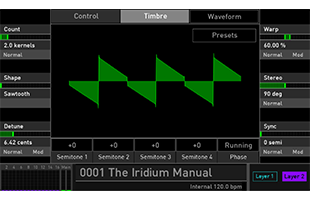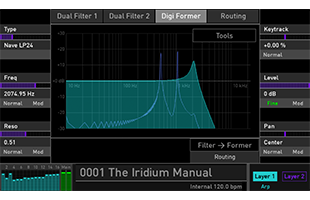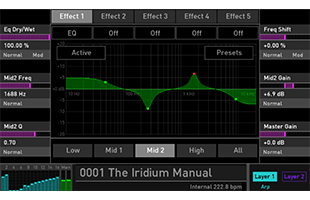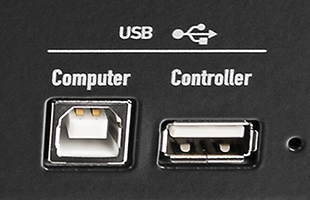
Save $455.65








The jaw-dropping sound and power of Waldorf Iridium are now available in a rock-solid, incredible-feeling 49-key instrument with polyphonic aftertouch. Explore 1,680 unique sounds and textures, save thousands of your own customizations and swap sounds with Iridium Desktop or the flagship Quantum Synthesizer. Explore the depths of wavetable, analog modeling, granular synthesis and more via Iridium's gorgeous color touchscreen and comprehensive knob-per-function surface.
Waldorf Iridium Keyboard is a 16-voice, duo-timbral synthesizer with 3 oscillators and 3 stereo filters per voice plus a robust selection of onboard effects. Within a single patch each oscillator can be assigned any of 5 digital synthesis engines: Wavetable, Waveform, Particle, Resonator and Kernel. A high-resolution color touchscreen greatly enhances the sound design process, providing rich visual feedback and allowing direct manipulation of synthesis parameters, while 6 freely programmable Macro buttons let users define functions from a wide range of features for additional performance control.
Poly aftertouch
Iridium's Fatar TP/8SK keyboard features polyphonic aftertouch and three contacts per key for new levels of response and playability: performers can hold down any number of keys simultaneously and then vary pressure at each finger individually, creating individual data streams for modulation purposes, whereas with traditional channel aftertouch all notes played will respond to only one. Iridium Keyboard is also capable of processing MPE (MIDI Polyphonic Expression) data.
Assignable Macro buttons
The Macro buttons adjacent to the pitch and mod wheels can perform a wide range of user-selectable features for additional performance control. Transpose the keyboard range, toggle glide on and off, assign transport controls for the audio recorder, access controller split and layer modes, send MIDI CC and program change information, change tuning scales, engage unisono mode or set the pitch bend range with these handy assignable controls.
Sound structure
An Iridium patch starts with its 3 oscillators, each of which can be assigned any of the 5 synthesis modes described below. The oscillators' output then passes through Iridium's filters, Digital Former, amplifier and up to 5 assignable effects, maintaining a true stereo signal throughout. Parameters across the entirety of this signal path can be affected by a variety of modulation sources, including traditional envelopes and LFOs as well as the Komplex Modulator and a 40-slot mod matrix.
Wavetable Oscillator
In addition to deep controls for assigning and sweeping factory or custom user wavetables, Iridium's Wavetable Oscillator also offers parameters for wavetable signal saturation/gain, pitch-independent spectral envelope control and a 'noisy' parameter to add character without affecting spectrum.
Waveform Oscillator
Here you'll find traditional analog synthesizer waveforms, including sawtooth, triangle, square/pulse and sine. Individual oscillator waveforms can be synced, detuned and spread across the stereo spectrum, while their actual waveshapes can be further affected and mangled by sweep-able, modulate-able Shape and Warp parameters.
Particle Generator
While at a basic level the Particle Generator makes sound by playing back audio samples, it's no mere 'sampler,' deriving its name from its optional granular playback capabilities. In Granular Mode, parameters are provided for grain count, grain pitch spread, grain pitch jitter, playback start position, playback length and playback position travel speed. Traditional sample playback is also available.
Resonator
Derived from the principles of physical modeling synthesis, Iridium's Resonator starts with an 'exciter,' which can be a noise impulse of varying length or even an audio sample, and then sends that impulse into a bank of resonant bandpass filters. Extensive controls are provided for both sections, including exciter source/length and resonator Q, Q curve and spectrum skew.
Kernel
This oscillator mode provides a modular approach to synthesis in which up to 6 audio 'kernels' can be combined into a single oscillator, with each kernel effectively an oscillator in its own right that can be assigned traditional waveforms, sine waves, wavetables, noise or samples. Kernels are not only layered together to create a unique timbre, they can also modulate one another at audio rates using amplitude modulation, frequency modulation, ring modulation, phase distortion and even audio rate wavetable position modulation.
Sampling and sample playback
As noted in the sections above, Iridium's Particle Generator, Resonator and Kernel oscillator modes can all work with audio samples in various ways. Iridium comes loaded with a wide variety of samples in its 2GB onboard memory and you can load your own from a microSD card or USB storage device. New samples can be recorded directly from Iridium's stereo 1/4" inputs, analyzed, edited and looped using the color touchscreen and then saved to memory for immediate use.
Filters and Digital Former
Iridium has two slots for traditional stereo filters that can be assigned a variety of slopes across high pass, low pass and band pass modes; these two filters can be run in parallel or combined with one another in various interesting ways. The Digital Former, meanwhile, provides even more signal-shaping and -enhancement options including drive, bit crushing, and ring modulation as well as additional digital filter models borrowed directly from Waldorf Nave, PPG and Largo.
Effects
Each patch can use up to 5 effects slots, with each assigned effect offering a deep selection of parameters that can be visualized and edited on Iridium's color touchscreen. Available options include chorus, reverb, delay, phaser, flanger, parametric EQ and compressor.
Envelopes, LFOs, mod matrix and Komplex Modulator
In the modulation department, Iridium offers an amp envelope, 2 filter envelopes and 3 freely assignable envelopes along with 6 LFOs and the unique Komplex Modulator, a special LFO with two different curves that can optionally be mixed together. Any of these modulators can be assigned as sources in Iridium's 40-slot, 96-destination mod matrix. Additional modulation sources include Iridium's CV/gate inputs, an onscreen X/Y pad with assignable axes and a variety of MIDI messages including pitch bend, mod wheel, keyboard velocity/pressure, breath controller and 10 CCs.
Panel and touchscreen
Iridium Keyboard makes most of its expanded top panel real estate with dedicated controls for various parameters across its 3 oscillators, dual filters, mixer, Digital Former, envelopess and LFOs. Surrounding its color touchscreen are 8 dedicated buttons to select modes and 6 soft knobs to control adjacent onscreen parameters, while the touchscreen itself provides tremendous visual feedback for various waveform and spectrum displays and allows direct touch manipulation of numerous parameters in its rich onscreen graphical representations.
MIDI and CV/gate
In addition to a robust MIDI implementation that allows various CCs to act as mod matrix sources, Iridium also exposes the mod matrix and various parameters to input from its 4 CV inputs and gate input. Additional clock in/out and start in connections allow you to control and clock Iridium's arpeggiator and sequencer from external analog sources.
USB and microSD
Iridium provides the MIDI-over-USB functionality you'd expect from a modern instrument via its USB-B USB to host port, but goes one step further by also including a USB-A MIDI to device port, which can accept MIDI input directly from class-compliant controllers and connect to USB storage devices for easy patch/sample data transfer and OS updates. Samples and patch data can also be loaded via Iridium's microSD card slot.
Patch compatibility with Quantum
Iridium Keyboard differs from Waldorf's flagship Quantum synthesizer in areas like voice count and onboard filter design, but the fact is they have more commonalities than differences, sharing their basic sound structure as well as the 5 synthesis engines, which means that differences notwithstanding patches may be freely transferred between Iridium and Quantum with full compatibility.
| Specification | Value |
|---|---|
| SKU | WAL-IRIDIUMKEYBCK |
| Vendor | Waldorf |
| Aftertouch | Yes |
| Analog Digital | Digital |
| Included From Manufacturer | Power supply |
| Keys Weighted | Semi-Weighted |
| Number of Keys | 49 |
| Key Size | Full Size Keys |
| Midi | In, Out, Thru, and USB |
| Mono Poly | Polyphonic |
| MPN | IRIDIUMKEYB |
| Product Unique Features | Polyphonic aftertouch |
| Arpeggiator | Yes |
| Control Connections |
(4) 1/8" CV inputs 1/8" gate input 1/8" start/reset input 1/8" clock input 1/8" clock output |
| Onboard Controllers |
Pitch bend wheel Mod wheel 6 assignable Macro buttons |
| Effects |
5 effects slots per patch Assignable effects include chorus, reverb, delay, phaser, flanger, parametric EQ and compressor |
| Expansion Options | microSD card slot for sample import, OS updates and patch transfer |
| Audio Inputs | Dual 1/4" stereo external audio inputs for processing or sampling |
| Audio Outputs | Dual 1/4" stereo outputs |
| Internal Storage Capacity | 2GB sample memory |
| Key Action | Fatar TP/8SK semi-weighted keybed with 3 contacts per key and polyphonic aftertouch |
| Multitimbral Capability | Duo-timbral |
| Oscillators per Voice | 3 |
| Product Weight | 33.86 lb |
| Programs/Presets |
1,000+ factory preset patches 7,000 patch storage locations Patch compatible with Waldorf Quantum (sold separately) |
| Sampling |
Generous selection of factory samples User samples may be loaded from microSD or USB storage Built-in sample recording/editing engine using stereo 1/4" audio inputs |
| Sequencer |
32 steps per measure Sequence note, velocity and length per step Create up to 4 additional sequences as parameter modulation sources |
| USB Flash Drive Port (to Device) | Program/Preset Storage;Sample Import;System Updates |
| USB Port (to Host) | MIDI |
| Voices of Polyphony | 16 |
| Width | 33.5" |
| Depth | 13.98" |
| Height | 4.33" including controls |
Waldorf 1-year Limited Warranty
Waldorf Music provides a one-year warranty covering defects in material and workmanship from the original purchase date. During this period, the company will repair or replace faulty products at no cost, provided the defect is confirmed by Waldorf Music or an authorized service center. Customers must contact their dealer or distributor before sending the product, which should be shipped in its original packaging with insurance. The warranty excludes damage from abuse, improper conditions, or unauthorized repairs and covers only defects that occur under normal operating conditions. More information can be found on Waldorf's website.
Ground shipping is FREE for all orders $99 and up.




































































YOUR MUSIC TECHNOLOGY STORE SINCE 1984